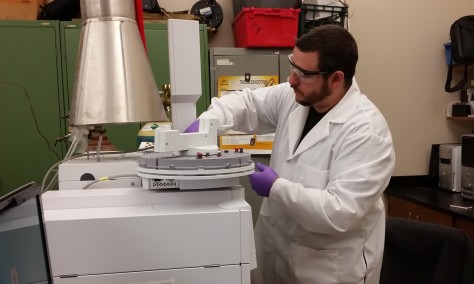Science is a unique profession because your career is based almost solely on your name. As a student you have to read many scientific papers and it is easy to forget that the author of that paper is still a person. These researchers have ambitions, passions, families, and people who have helped them along the way. The Coastal Waters Consortium has many researchers at all levels and we wanted to feature some of them to show off not just their work, but their personalities as well.
Dr. Gregory Olson is a Research Associate II in the Response and Chemical Assessment Lab under Dr. Ed Overton. Currently Dr. Olson is working on sediment analysis for trace crude oil components as well as biomarker analysis and fingerprinting for specific crude oils.
Dr. Olson reports, “One of the more surprising things I have seen is the resiliency of sequestered oil in coastal marshes. Some of the samples we analyze show signs of delayed weathering. This has impacted my work with utilizing oil fingerprinting techniques to get a better idea of what kind of oil we are seeing in these samples.”
His work for Dr. Overton has not only helped understand the oil Dr. Overton’s lab is studying, but clarify some things for other researchers within the CWC. As scientists it can be difficult to explain to family members and friends what they do for a living. Often the people close to them have a vague understanding of they day to day life at work. Dr. Olson’s family believes he makes “environmental tea” and then runs it on the CSI (TV show) machine looking for pollutants. According to Dr. Olson this explanation “is not too far from the truth!”
Every job has its highlights and for Dr. Olson “field sampling is my favorite part of the job. I love being out on the water all day, cannot beat fresh air and sunshine!”. It is this part of the job for many field scientists. The part that gets them through the days when they have to process samples inside. Dr. Olson agrees saying “my least favorite part of the job is sample analysis, strictly speaking. It is fun when discovering something new or interesting but over time the process can get mundane. Integrating the same 75 odd compounds per sample for batches of 30, 50, or 100 samples can get tiresome.” All scientists agree that even though proces
sing samples can get tedious it is always exciting to realize that you have found something interesting.
Science is often a fine balance of planning and adapting to situations. This means that field science has a level of unpredictability that leads to some pretty interesting stories. For Dr. Olson recalls a time when “…I was out with another research assistant going to collect samples. It wasn’t until after we put the boat in the water that we realized we forgot to replace the drain plug! We scrambled to get it in place as our boat was taking on water. Luckily we were able to do so rather quickly and the boat was no worse for wear.”
It is always important for us to appreciate all of our hardworking scientists at the Coastal Waters Consortium! Dr. Gregory Olson is only one example of the great people that we have working on the questions of oil in the Gulf of Mexico.
